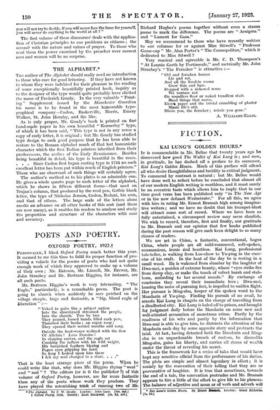POETS AND POETRY.
OXFORD POETRY, 1922.t
PERSONALLY, I liked Oxford Poetry much better this year. It seemed to me this time to fulfil its proper function of pro- viding a vehicle for the poems of poets who had not quite
enough work of which they approved to make up a volume of the own ; Mr. Bateson, Mr. Linnell, Mr. Brewer, Mr. John Strachey and Mr. Bertram Higgins, for instance, are all such poets.
Mr. Bertram Higgins's work is very interesting. " The Eagle," particularly, is a remarkable poem. The poet is going to church when suddenly he sees perched on the village steeple, huge and fantastic, a " big, bland eagle of liberation " :-
" Yoked in pairs like a subject nation
Into the churchyard streamed the people, Into the church. Two by two
They paused, loosed hands, filled each pew,
Thumbed their books ; an organ rang ; They opened their serried mouths and sang.
Outside the heat-waves waltzed with the flow Of Alleluia l Laus Domino !
In clasping curves, and the eagle sat Crushing the rafters with his wild weight, His burnished feathers blazing and Pagan eyes gripping the land.
So long I looked upon him there
I felt my soul changed to a stare. . . ."
That is the least strange piece of the poem. When he could write like that, why does Mr. Higgins rhyrap "weal" and " real " ? The editors (or is it the publisher ?) of this
volume of Oxford Poetry, however, are far more fantastic than any of the poets whose work they produce. They have played the astonishing trick of running two of Mr.
• rs. Alyliabet. By F. W. Cloudy. London : John-Lene. Ms. poi.] 1 0004 Poetry, 1922. Oxford ; Basil Blackwell. (3e. Cad, net.]
Richard Hughes's poems together without even a stanza pause to mark the difference. The poems are " Aenigma and " Lament for Gaza."
May we recommend to those who have recently written to our columns for or against Miss Sitwell's " Professor Goose-cap " Mr. Alan Porter's " The Cosmopolitan," which is dedicated to Miss Sitwell ?
Very musical and agreeable is Mr. C. D. Thompson's " At Loonin Garth by Portinscale," and metrically Mr. John Strachey's " The Forsaker " is attractive :- " Old and forsaken houses
Lie and rot, And all the lived-in rooms Grow thin and bare.
Stopped with a sickened sense We venture not On soundless floor or naked treadless stair.
Dead things that move, Bimini paper and the trivial crumbling of plaster Mimic life's stir, Mimic you, the forsaker ; mimic you gone."
A. WILLinnts-ELLis.










































 Previous page
Previous page